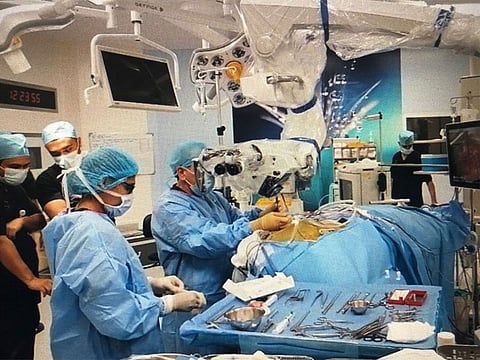Delicate 12-hour surgery in UAE saves vision of Abu Dhabi woman
Complex procedure at Burjeel Medical City used real-time MRI scans to ensure accuracy

Abu Dhabi: A 12-hour surgery has saved the vision of an expat woman in Abu Dhabi, Burjeel Medical City has said.
The patient, in her 40s, had been suffering from declining vision, and a medical team detected a gelatinous and growing tumour that measured 4cm at the time of presentation. The tumour had been pressing on the patient’s optic nerve, leading to vision impairment and a weakening of the eye muscles. It also hindered the normal movement of the iris, which resulted in bulging eyeballs.
Surgeons at the hospital used an advanced intraoperative MRI scan to get real-time images of the tumour, and its surrounding areas, before and during the complex procedure.
Following the procedure, the patient has started to regain her sight. She was discharged from the hospital five days after the procedure.
Zero margin for error
Dr Salim Kanaan, consultant neurosurgeon at the hospital who performed the surgery, said: “The location of the tumour made it complicated and challenging, but the procedure was successful. We removed the entire tumour without damaging any blood vessels or the optic nerve itself. Any error while doing the surgery would have caused blindness, or damaged the optic nerve of the patient.”

“The technology enables us to scan images in real time on the screen in the operating room. So there is no chance of committing a clinical error. It spares the patient from undergoing a second surgery, and reduces the need for follow-up chemotherapy or radiation,” Dr Kanaan said.
No metal zone
Operating rooms with this kind of MRI technology have to meet certain specifications, aligning with the characteristics of the magnetic field. The equipment in the room, including the breathing apparatus, surgical operating beds, and screens, therefore have to be fully metal-free. Even the operating table is plastic, with a surgical bed installed on it.

Sign up for the Daily Briefing
Get the latest news and updates straight to your inbox